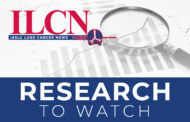
Tyrosine kinase inhibitors (TKIs) have revolutionized treatment outcomes in patients with non-small cell lung cancer (NSCLC). However, long-term toxicities of TKI treatment, including weight gain, are increasingly recognized. Weight gain is primarily reported in studies involving alectinib, lorlatinib and, neurotrophic tyrosine receptor kinase (NTRK) inhibitors.1
As outlined in the 2023 ESMO guidelines, preferred first-line treatment options for patients with advanced ALK-positive NSCLC include alectinib, lorlatinib, and brigatinib, each of which has demonstrated remarkable progression-free survival (PFS) benefits. Notably, the median progression-free survival (mPFS) for alectinib is 34.8 months, while the mPFS for lorlatinib has not yet been reached after five years of follow-up. The indications for ALK-TKIs will likely expand, as recent studies suggest that adjuvant alectinib significantly improves disease-free survival in patients with early-stage resected NSCLC.

Given the long duration of therapy with these agents and the expectation of long-term survival, addressing the side effect of weight gain has become increasingly critical. A cohort study involving 46 Dutch patients treated with alectinib highlighted an unhealthy change in body composition, characterized by an increase in visceral adipose tissue and waist circumference, leading to a higher incidence of sarcopenic obesity.1 Another study revealed that weight gain has been underreported in clinical trials involving alectinib, with nearly half of patients enrolled experiencing weight gain of more than 5% from their baseline body weight.2

The mechanism of weight gain is not yet fully understood. It may be related to tropomyosin receptor kinase B (TRKB) inhibition. It has also been observed with lorlatinib, another mainstay in the therapy of ALK (+) mNSCLC.
Obesity has been linked to more than 200 diseases and can negatively affect physical health, psychological well-being, and quality of life, though we have little prospective information about its impact on lung cancer. Lifestyle intervention (diet and exercise) represents the cornerstone of obesity treatment. In addition, in the last decade, effective pharmacological interventions for weight management using glucagon-like peptide-1 receptor agonists (GLP-1 RAs) have emerged. GLP-1 RAs, such as liraglutide, semaglutide, and tirzepatide, function by mimicking endogenous GLP-1 activity, leading to improved insulin sensitivity, delayed gastric emptying, and enhanced satiety. The efficacy of semaglutide in achieving clinically meaningful weight reduction has been demonstrated in the STEP clinical trials.3 However, patients with malignant neoplasms were excluded from these trials.

The integration of GLP-1 RAs to treat TKI-induced weight gain represents a promising avenue for further research. The successful combination of a GLP-1-RA and a TKI has been described in a case report regarding a patient who started semaglutide after to alectinib-induced excessive weight gain.4 However, several factors must be carefully considered before adopting this treatment strategy. Given their common gastrointestinal side effects, GLP-1 RAs could theoretically reduce the absorption of oral TKIs. This is particularly relevant for alectinib, due to its lipophilicity and strong dependence on dietary fat for adequate dissolution.

Since alectinib is associated with low bioavailability, sufficient food intake is essential to maintaining adequate exposure.5 To our knowledge, the first study to combine a GLP-1 RA—semaglutide, in this case—with a TKI, alectinib, showed a clinically relevant 32% decrease in total alectinib exposure compared to alectinib monotherapy after just a single administration of semaglutide.6 This interaction is particularly relevant, as a retrospective analysis showed that alectinib plasma trough levels above 435 ng/mL were associated with prolonged treatment efficacy compared to lower troughs.

The clinical significance of this threshold for PFS is currently being investigated in a prospective randomized trial—the ADAPT-ALEC study—which is actively recruiting patients in Europe (NCT05525338). This study will provide important insights into the clinical implications of maintaining adequate alectinib exposure and may underscore the need for therapeutic drug monitoring in clinical practice, especially in patients who may be eligible for treatment with GLP-1 Ras. While an exposure-response relationship for lorlatinib has not yet been established, a comparable interaction with GLP1-RAs could potentially affect this ALK inhibitor as well, even though lorlatinib uptake is not food-dependent.
Prevention of weight gain remains preferable over obesity treatment. Patients should be informed about this side effect before the start of treatment and a consistent walking/exercise program is advised when possible. New studies focusing on both efficacy and safety when administering GLP-1 RAs for treating TKI-induced weight gain are needed before implementing this potentially promising treatment strategy. A new prospective cohort study by our research group specifically addresses this issue in patients with NSCLC. We eagerly await the results, as well as those of other promising studies on the topic, which will likely be published in the coming years.
References
- 1. de Leeuw SP, Pruis MA, Sikkema BJ, et al. Analysis of Serious Weight Gain in Patients Using Alectinib for ALK-Positive Lung Cancer. J Thorac Oncol 2023;18:1017-1030.
- 2. Sikkema BJ, Baart SJ, Paats MS, et al. Body Weight Gain Associated With Alectinib in Patients With ALK+ Non-Small Cell Lung Cancer: Pooled Analysis of Individual Patient Data From Four Prospective Clinical Trials. J Clin Oncol 2024:JCO2401579.
- 3. Garvey WT, Batterham RL, Bhatta M, et al. Two-year effects of semaglutide in adults with overweight or obesity: the STEP 5 trial. Nat Med 2022;28:2083-2091.
- 4. Lee ATM, Ou SI, Lisberg A. Letter to Editor. Re “de Leeuw SP, et al. Analysis of Serious Weight Gain in Patients Using Alectinib for ALK Positive Lung Cancer,” Semaglutide a Potential Treatment for Serious Weight Gain From ALK Tyrosine Kinase Inhibitors? J Thorac Oncol 2023;18:e97-e99.
- 5. Lanser DAC, de Leeuw SP, Oomen-de Hoop E, et al. Influence of Food With Different Fat Concentrations on Alectinib Exposure: A Randomized Crossover Pharmacokinetic Trial. J Natl Compr Canc Netw 2023:1540-1413.
- 6. Lanser DAC, Heersche N, Oomen-de Hoop E, et al. 1280P Effects of semaglutide on the exposure of alectinib in patients with NSCLC. Annals of Oncology 2024;35:S817.





